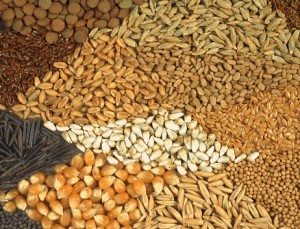100 smallholder farmers introduced to high-yield climate-resistant hybrid seedlings
 The effect of the rampaging climate change has presented a considerable challenge to the socioeconomic development of Ghana where rain-fed agriculture provides livelihoods to millions of households.
The effect of the rampaging climate change has presented a considerable challenge to the socioeconomic development of Ghana where rain-fed agriculture provides livelihoods to millions of households.
The environmental dilemma has dire repercussions for the attainment of the United Nations Sustainable Development Goals (SDGs), particularly those relating to poverty reduction and food security.
Towards reversing the trend, the Alliance of Biodiversity International, in collaboration with the International Centre for Tropical Agriculture, has implemented an agricultural development project to help more than 100 crop farmers in the Central Region get access to critical information needed to improve their work.
The project, known as the Accelerating Impacts of CGIAR Climate Research for Africa (AICCRA), seeks to make climate information services and climate-smart agriculture more accessible to small-scale farmers across Africa for optimal health outcomes for people, animals and plants.
Funded by the International Development Association (IDA) of the World Bank, the project is supported by the International Institute of Tropical Agriculture (IITA), Council for Scientific and Industrial Research – Crops Research Institute (CSIR – CRI), Centre for Agriculture and Biosciences International (CABI), Esoko and the Ghana Meteorological Agency (GMA).
The GHC6 million three-year project, which began in 2021, is geared towards limiting the use of inorganic chemicals on farmlands while encouraging bio-friendly products.
The project covered about 22 communities, 12 districts and 31 demonstration sites in the Upper East and West regions, Northern, Bono East, Greater Accra and Central Regions.
In the Central Region, AICCRA has secured demonstration sites at Enyinase and Dompoase in the Komenda-Edina-Eguafo-Abrem Municipality and Efutu and Dahia in the Cape Coast Metropolis to train farmers to successfully implement ‘one-health’ and climate-smart agriculture projects.
AICCRA had also engaged the public in awareness campaigns to support new business models which engage enterprises led by women and young people and climate resilience to sustain national food security.
Ghana’s maize production now stands at a little over three million tonnes per annum, with 1.7 metric tonnes per hectare as the average yield, but this could rise to more than 15 million metric tonnes with the new seed.
Explaining the rationale for the project at a farm visit at Dompoase, Dr Stephen Yeboah, the Senior Research Scientist with CSIR, said the beneficiary farmers had undergone three-month training on planting various varieties of maize and potatoes using modern agronomic practices.
The yellow maize varieties include; Abontem, Suhudoo, Honampa and doribea.
They were also into onions and potatoes while the soil was treated with neem liquid extract to prevent weevils and fungal infestation.
In addition, the farmers were taken through presentations on their adopted interventions, including farmyard manure management, environmentally friendly pest and disease management, market and climate information services and social inclusiveness.
According to him, the farmers built their capacities on finding solutions to fertilizer, pest and climate change challenges and with the help of Esoko, coordinated their activities to prevent wastage of resources and reduced cost.
Arrangements had also been made for the farmers to receive weather information in various languages on their phones to help them to plan.
A beneficiary farmer, Nana Afua Simewuah, Queen Mother of Dompoase, told the Ghana News Agency that the improved seeds were important in raising yields and ensuring food security, proper nutrition and prosperity for not only smallholder farmers but the entire population.
She said increasing the quality of seeds could increase the yield potential of the crop by significant folds and thus, is one of the most economical and efficient inputs to agricultural development.
Other beneficiaries described the intervention as opportune, particularly at a time when the demand for maize continued to outstrip supply, thereby impacting prices.
“The variety performed well in all soil types and even performed better in acidic soil with exceptional nitrogen use efficiency (NUE). It is also tolerant to Striga, the most dangerous weed to maize.
“In fact, it is the best option for commercial and small farming because the high yield potential is guaranteed when planted,” the farmers observed.
Mr Ebo Appiah, the Municipal Chief Executive for KEEA, commended the initiative as the surest way to boost the livelihoods of poor farmers across the country and support greater food security by making climate-smart agriculture innovations accessible to farmers off the shelves and into fields.
He said the project would connect existing local, regional and international expertise to strengthen the technical, institutional and human capacity of Ghanaians to improve their livelihoods.
Source: GNA
